Enlightenment redux
Richard Law, UTC 2015-11-19 13:53 Updated on UTC 2016-02-10
Let there be light
'Enlightenment'? Hey, who doesn't want that? Let's drive away the forces of darkness.
Whilst so many otherwise pleasant words have dark sides – 'sweet' can describe the smell of the rose but also the drink that will, we are told, knock ten years off our life expectancy – 'enlightenment' and all its derivatives are universally positive. Who, after all, wants 'darkening'?
Recently, Brendan O'Neill wrote that
That’s enough cultural appeasement; fight – really fight – for the Enlightenment.
I have great admiration for O'Neill and agree with him on most things. But this time, Brendan, count me out. The Enlightenment died over two hundred years ago, its purpose served. There is no point trying to revive it to battle against cultural appeasement. It couldn't do that then, and it can't do it now. I would go so far as to say that the Enlightenment is the last thing we need at this moment. Here's why.
Understanding the Enlightenment
The historical period called the Enlightenment (~1650-~1800, but mainly 17th century) arose from the confluence of two great, almost parallel, movements: the Reformation (~1500-~1650) and the Scientific Revolution (~1550-~1750).[1] It could not have existed without them. To understand the Enlightenment, we have to understand these two movements. Bear with me – go and get yourself a glass of something steadying.
The Reformation: Breaking the Catholic monolith
The Reformation shattered the Catholic Church. Before the Reformation, there was one dominant religion in western Europe: Catholicism. It was a monolithic religion: there was a single theology and all other knowledge – whether astronomy or jurisprudence or whatever – had to be consistent with that theology. If it wasn't, that knowledge was wrong.
After the Reformation, the monolith of Catholicism was still there in a reduced form, but alongside it were multiple varieties of Protestant faiths and with them a range of doctrines of self-determination that completely contradicted the organization, hierarchy and authority of the Catholic Church. The Church was Catholic in name, but no longer catholic – 'all including' – in nature. The Reformation had relativised belief. At the start of the Reformation there had been one monolithic Catholic orthodoxy; by the end there were many different doxies, apparently all of equal status:
Here's my wisdom for your use, as I learned it when the moose
And the reindeer roared where Paris roars to-night:—
There are nine and sixty ways of constructing tribal lays,
And—every—single—one—of—them—is—right![2]
The Reformation had reduced the extent of Catholicism, but it did not bring a general doctrinal softening: Some of the flavours of the new Protestant religions were bigoted and totalitarian: we only need to mention the word 'Puritan' to give evidence for that. Nor did the variety of faith that the Reformation created spread religious or any other kind of tolerance. Quite the opposite, in fact. Martin Luther himself was a vicious antisemite, who in today's world of 'hate speech' would certainly be in prison; relaxed diversity of opinion was not a feature of Calvinism, as the German sociologist Max Weber noted:
The rule of Calvinism, as it was in the 16th century in Geneva and Scotland, around the turn of the 16th and 17th centuries in large parts of the Netherlands, in the 17th century in New England and from time to time in England would be for us the most unbearable form of clerical control of the individual imaginable. That was also how it was experienced by broad strata of the patrician classes of the time in Geneva, as well as in Holland and England. [3]
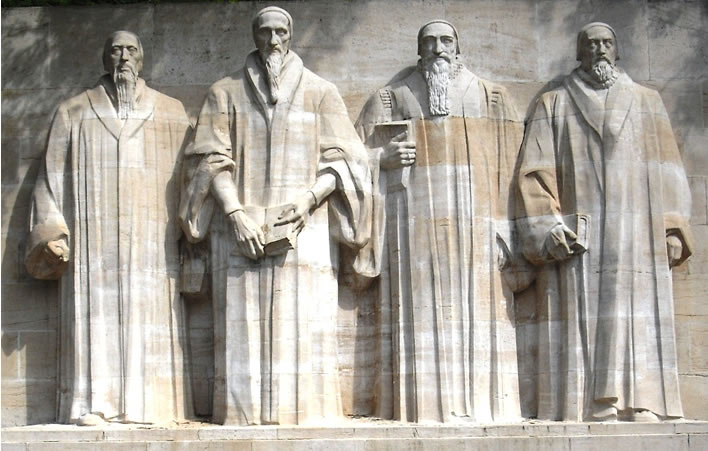
The central part of the 'Reformation Wall' (1909) in the grounds of the University of Geneva.
The dinner party guests from Hell lining up for the selfie are (l-r): William Farel (1489-1565), John Calvin (1509-1564), Theodore Beza (1519-1605) and John Knox (1513?-1572). The statues are more than three times life-size, so standing in front of them is not for those lacking self-esteem.
In the maelstrom of competing sects at the time there was simply no place for tolerance and diversity. In Europe in the three centuries between 1500 to 1800 if your face or faith didn't fit wherever you happened to be living your outlook was poor: if you were not killed outright you might be beaten, forcibly expelled with your family and your property confiscated. As the turmoil of the Reformation and Counter-Reformation raged in Europe, unknown thousands of individuals and families suffered this fate.
The Reformation had at least fragmented the former feudal territories of Europe so that there were now some safe havens for like-minded people to live together in relative peace.
The Scientific Revolution: The world of things
Almost simultaneously, empiricism – that is observation, reason and testing – began to replace disputation and the various appeals to authority, whether that authority came from the Bible, Aristotle, some Church Father or scholastic philosopher. Copernicus, Keppler and Galileo made painstaking observations and measurements which, to rational minds, carried more weight than the opinion of some monk's reading of a sentence in the Old Testament. Empiricism was cool. Those with time and money in Europe took part in the latest craze: scientific experimentation.
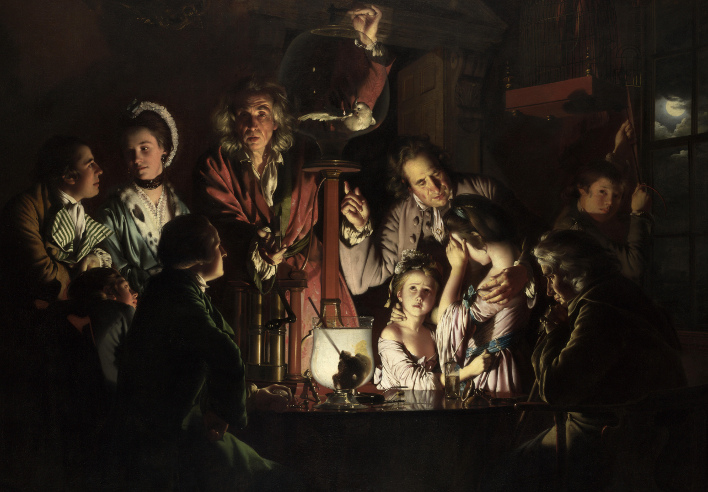
Joseph Wright of Derby, An Experiment on a Bird in the Air Pump, 1768. (The National Gallery, London)
The two movements, the Reformation and the Scientific Revolution went hand in hand: empiricism required protection and safe havens from the Catholic Church, which pursued the empiricists that questioned its nonsensical speculations with those two great expressions of brotherly love, fire and sword. The safe havens were provided by the Reformation.
The Protestant faiths, although not particularly religiously or socially tolerant, could see the utility of empiricism in improving the lot of mankind in this world. Since their doctrines rested on the idea of individual salvation by faith alone and also encouraged an individual, almost empirical, access to the Bible, they laid the ground for the more general individualism and empiricism that would build on them. Once the Scientific Revolution had asserted the primacy of reason and trained the habit of empirical thinking, the way was open to the next great movement: the Enlightenment.
The Enlightenment: The world of humans
The Enlightenment extended the Scientific Revolution to encompass the traditional humanities, particularly jurisprudence and constitutional law. Because the Enlightenment is an extension of the Scientific Revolution they share an important characteristic: both are more concerned with process than with content, doctrine or any particular result.
The heart of the Scientific Revolution is not one or more discoveries, it is not Newton's laws of motion or Boyle's gas laws, it is the adoption of the process of the scientific method – empiricism, if you prefer it – that leads to such discoveries. In the same way, the Enlightenment is not a laundry-list of concepts such as freedom and tolerance that took hold, but the processes of 'enlightened thought'. Two of these processes were particularly important: the collection of data and the primacy of individual thinking.
Enlightenment trait: Collecting and classifying
An example of data collection is found in one of the fathers of the Enlightenment, Montesquieu (1689-1755), in his epochal L'Esprit des Loix ('The Spirit of Laws', 1748), who undertook an immense survey of the various types of government in the world. The work took him about twenty years. Not only did the comparative approach of this work allow general lessons about statecraft to be drawn, it reduced every fiefdom to just being one variant among many, just so many different insects in a collection. Montesquieu's epic also formed the idea of the state as an entity separate from its ruler, the famous doctrine of the separation of powers.
Louis XIV of France (1638-1715) was reputed to have stated that l'État, c'est moi. The Empress Maria Theresia of Austria (1717-1780) liked to look upon herself as the Landesmutter ('Mother of the Nation') and her subjects as her children. Indeed, right up to her time the Habsburg rulers thought of themselves as a dynasty with a large number of territories attached. The viewpoint changed from 1780 onwards, with Maria Theresia's son Joseph II (1741-1790), who liked to parade his Enlightenment credentials, now referring to himself as 'the first servant of the state'.
In the deservedly famous painting of the two imperial brothers Joseph and Leopold (1747-1792) done by Pompeo Batoni (1708-1787) in Rome in 1769, Joseph, the Enlightenment show-off, is pointing at two volumes of L'Esprit des Loix and has draped himself rather disrespectfully across the knee of Minerva, the Roman goddess of wisdom, who is enthroned behind him. Maria Theresia loved the painting, but as a mother: her two boys looked beautiful. The newfangled Enlightenment stuff worried her deeply.
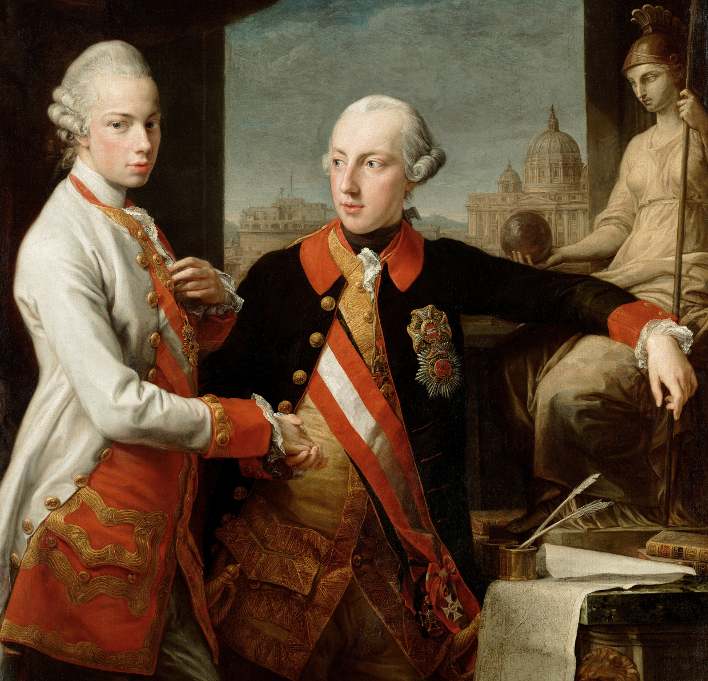
Pompeo Batoni: Emperor Joseph II and Archduke Pietro Leopoldo (from 1790 Leopold II), Rome, 1769.
Archduke Leopold, pale and interesting, is on the left, fingering his Order of the Golden Fleece. Emperor Joseph's left arm is draped over Minerva's knee and pointing down at the books on the table, Montesquieu's L'Esprit des Loix.
In their 'Systematic Dictionary of the Sciences, Arts, and Crafts', published principally during the second half of the 18th century, the Encyclopédistes were doing for the social world of humans what the scientists were doing for the physical. They were classifying and collecting information about everything. As far as they were concerned, all human life was indeed there. As Pope famously put it in 1734:
Know then thyself, presume not God to scan;
The proper study of mankind is man.[4]
Enlightenment trait: The individuality of truth
The other major Enlightenment process is the use of rational thought by each individual to test, assess, concur with or counter ideas. That process was not an optional one, it became the duty of every enlightened person to open their mind to rational thought. Immanual Kant (1724-1804) compared the process of arriving at Enlightenment to the moment of coming of age: suddenly the 'guardians' – for example religious leaders – who had controlled your intellectual life up to then had gone and you were on your own. You now had to assess and decide without that comfortable crutch. Kant noted that many people preferred the ease of following guardians over the rigours of mental independence. [5]
The starting point for rational thought was to clear the mind as far as possible of all assumptions, prejudices and superstitions. Since the social life of mankind is built around these three things, this was a brave requirement, particularly since the primary repository of these three things was religion.
Reason slowly superseded dogma and much that had been accepted belief became mere superstition. Religion of all forms became the target. The great weapons of the Enlightenment were satire and mockery, wielded most tellingly by Voltaire (1694-1778), who believed in a God (the great watch of the universe need a watchmaker after all) and Holbach (1723-1789), who was an atheist. Montesquieu was also an effective satirist, despite his twenty years of drudgery on L'Ésprit. Enlightenment was a dangerous pastime, though, despite the fact that religion in Europe had become fragmented. All the thinkers of the Enlightenment lived in some sort of danger, many were imprisoned or expelled, lost property and income. Many kept on the move from one fiefdom or one country to another. Some were imprisoned and some even lost their lives.
The German chronicler Schubart (1739-1791) tells us of a young man he befriended when he was in Ulm in 1775 called Josef Nickel. Josef had had a Jesuit upbringing but strayed from the path, even to the extent, we are told, of trying to visit Voltaire in Geneva. Both Schubart and Nickel were safe in Ulm, which was an Imperial Free City, but Nickel made the mistake of straying back into Catholic territory, to the beer-garden of his old school, the Abbey of Wiblingen, a magnificent rococo structure that you can still visit today. The Abbey is barely five kilometres from the centre of Ulm, but was in a different, Catholic world.
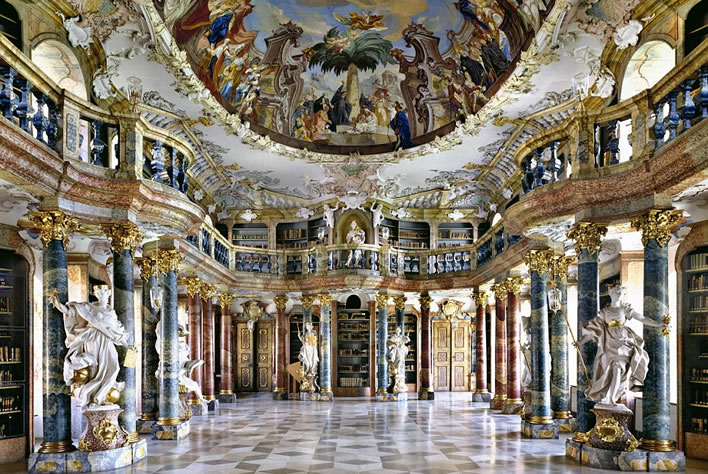
The library, Wiblingen Abbey, near Ulm, Germany, The Abbey has a website for all you rococo fans.
He was arrested for theft and various acts of blasphemy against various saints and, without any trial, condemned to death by burning. As a special act of mercy his head was to be hacked off first. On 1 June 1776 before a large crowd he was handed over to the executioner, beheaded, his remains burned on a pyre and his ashes thrown in the river. He was 26.
'A terrible act, that could only occur in the darkest corner of Catholic Swabia!' exclaimed Schubart, appalled and now very aware of the danger he was in himself. Yes, enlightenment was indeed a risky thing. [6]
Enlightenment trait: The attack on superstition
Voltaire is the great hero in this battle. He was not only highly intelligent, witty and industrious he was also clever. His had an estate in both Geneva and close by in Ferney in France, so he could remove himself himself from whichever side he had offended at any particular moment. He was financially very astute and built up a huge fortune. He was lending money to the nobles of Europe – Duke Carl Eugen of Württemberg is a notable example – who kept running out of cash in the hopeless but continuing attempt to keep up with the excesses of the French nobility. Voltaire was not just some annoying mosquito: many powerful people were indebted to him. His primary target – some would say obsessively so – was religious bigotry, of which there were sufficient examples available to keep him busy during a long life of scribbling.
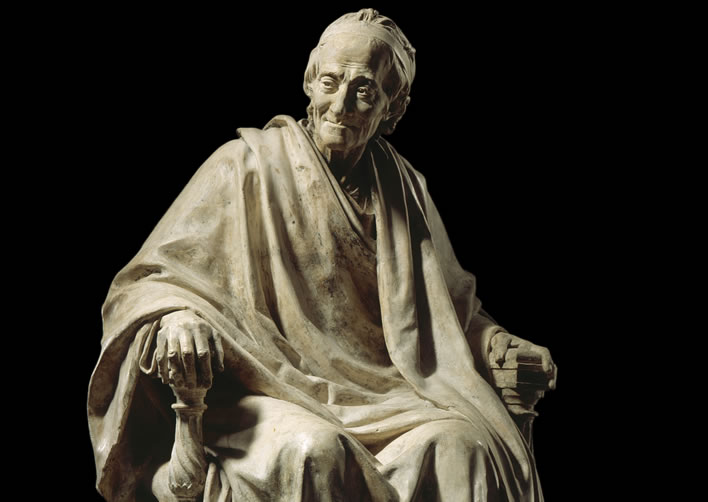
Seated Voltaire by Jean-Antoine Houdon (1741-1828), c. 1779-1795, Los Angeles County Museum of Art (LACMA).
Our hero, always amused, even when angry.
In 1765 he wrote the following passage. Typically, he put the words into the mouth of his character Monsieur Théro, a rather naive would-be Calvinist struggling with the contradictions and improbabilities of the religious texts with which he was confronted. Voltaire liked using simple, unsophisticated characters in his works: they were gormless enough to ask the key and basic questions that the sophisticates never would, just as it required a child to point out the Emperor's lack of clothing in Hans Christian Andersen's tale 'The Emperor's New Clothes' (1837). On this occasion the Voltaire's mask slips and we hear the author's own words. Exactly two hundred and fifty years later they are still applicable:
At one time there were people who said: you believe things that are incomprehensible, contradictory and impossibilities because we have ordered you to do so; now do what is unjust because we have ordered you to do it. These people reason wonderfully. It is true that whoever has the power to make you absurd also has the power to make you unjust. If, ignoring the intelligence that God has placed in your mind, you do not resist the orders to believe the impossible you will be unable to resist the orders to do wrong and thus ignore the sense of justice which God has placed in your heart. Once one faculty of your soul has been tyrannised, all the other faculties will be, too. And it is that which has produced all the religious crimes with which the Earth has been inundated. [7]
We see here one of those enlightenment characteristics, the process of thought in the individual and the responsibility for that. The individual has a mind with God-given 'intelligence' and a heart with a God-given sense of 'justice' and is not just able but rather obliged to use these.
The creation of the United States
Those who want to see all these 'enlightened' processes in action only need to read the documents and correspondence of the Founding Fathers the United States. We might call these texts 'enlightened', but we should more accurately say the the process by which these documents came into existence was an Enlightenment process. The Founding Fathers lived in the midst of the great Enlightenment vortex; they were all part of that turbulent process of applying rational thought to the social life of mankind.
Individualism is at the core of this process. Thomas Jefferson, who had several editions of Holbach in his private library, was particularly always wary of the danger of 'groupthink' and organizational dogma to the freethinking individual. Benjamin Franklin is the polymath who seamlessly applied empirical methods to both the physical and the social worlds. He believed no idea until he had examined it himself.
That problematic use of 'self-evident' in the United States Declaration of Independence (1776) is revealing:
We hold these truths to be self-evident, that all men are created equal, that they are endowed by their Creator with certain unalienable Rights, that among these are Life, Liberty and the pursuit of Happiness.
'Self-evident' causes philosophical sophisticates much epistomological heartache but to the enlightenment thinker the most important word in this expression is 'self'. It is a request for the application of an enlightenment process: think for yourself, just as it was for Voltaire and just as it was for Kant. The enlightenment process is an individual process. Those 'unalienable Rights' also are the rights of individuals, not organizations. Even today the USA is the country where being a rugged individualist – thinking for yourself, defending yourself, believing for yourself and living for yourself – is a prized aspect of the national character.
The problem of social cohesion
For the thinkers of the Enlightenment therefore, there are no subjects that are off-limits, no assumptions that are unshakeable and no dogmas that are untouchable.
Well, that's all very nice, but we individuals are all embedded in social structures with various functional conventions such as taste and decency. Just as the member of a church has to accept some doctrinal common ground with the other member, so to be a member of society there are certain conventions that have to be accepted if you want to stay in your community.
If your God-given 'intelligence' and your heart with a God-given sense of 'justice' has led you to want sexual relationships to be unrestricted in age, gender or privacy, unlimited drug use and who knows what else, then you have to find some like-minded individuals and go off and found your own community.
This route leads inevitably to a poisonous moral equivalence.
The death of the Enlightenment
The Scientific Revolution, the empiricism of the physical world, went on from strength to strength and is the determining factor of life in our modern world: every aspect of our entire lives is dependent on scientific and technological knowledge.
Its humanistic counterpart, the Enlightenment, died. It was a sudden and violent death that can be quite accurately dated: 14 July 1789, the storming of the Bastille that marked the visible start of the French Revolution. And it was – as visitors to this blog will know – Jean-Jacques Rousseau who administered the poison to the Enlightenment that eventually killed it.
Unity through the general will
We have to give credit to Jean-Jacques Rousseau – admittedly through gritted teeth – for addressing the core problem with this Enlightenment lark: if everyone is busy thinking for themselves, how does anything ever get done? If everyone has a duty to question and examine everything, in what way can any consensus ever be achieved. Rousseau invented his mystical and barely defined idea of the 'general will', the unity that mysteriously arose among a group of people that produced the 'common good'.
The Founding Fathers of the United States had finished their task by 1789. There had been plenty of questioning during the process but they created a society that owed its structure and the logic behind it to Montesquieu not Rousseau. The rethinking of the constitutional basis of a country succeeded not particularly because of the enlightenment, but rather because the people doing the thinking were skilled, learned, calm and sober: they were serious people and so could handle the dangerously open processes of Enlightenment thought. Fortunately, these sober men managed to do their work without needing to invoke Rousseau's 'general will' to take the decisions of state.
In contrast, Jean-Jacques delivered the concept that the wild ones, the haters and the demagogues behind the French Revolution found so useful. Without it, the French Revolution would have merely resembled the Students' Union of a low grade polytechnic on a Friday night. There would have been some uncoordinated mob violence, but nothing the authorities could not have controlled with will and effort. But unlike the United States, Enlightenment thought with its dangerous openness came into the minds of lunatics who lacked exactly that which Voltaire described: intellect in their minds and justice in their hearts. Rousseau, with his muddled thinking, even let that enemy of all rational thinkers, the fanatic, loose to impose his great ideas on the world. Rousseau was never really an Enlightenment thinker. He was a Romantic.
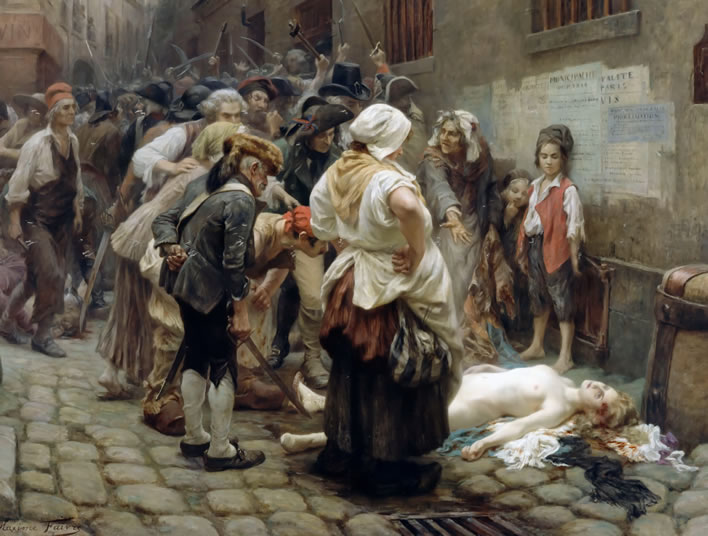
Marie-Thérèse-Louise, princesse de Lamballe (1749-1792), friend and companion of Marie-Antoinette during her imprisonment, was butchered and her corpse violated and mutilated on 3 September 1792 by a mob in Paris acting in accordance with the general will. Not much enlightenment to be seen, though.
For about eight years, until authoritarian rule and order was restored, the monsters of the Terror could use the fig-leaf of the general will to justify everything they did. Selected bits of the works of the great names of the Enlightenment in France, most now long dead, were co-opted to the cause. Everything was mercilessly rethought, in the best Enlightenment fashion: religion was reinvented, the calendar was improved on rational principles and so on and so forth. A paradox worthy of Voltaire was the phenomenon of empiricists taking the opportunity of the slaughter to investigate among all the blood spatter at the scene the physiological effects of chopping a person's head off: 'Blink twice if you are still conscious'. Madame Guillotine herself was the physical embodiment of lunatic rationality, the perfect symbol of thinking gone mad. In brief, this is where the Enlightenment had got the French.
How Voltaire would indeed chuckle at our modern absurdities. Hundreds are slaughtered by a handful of Muslim fanatics and for some inexplicable reason we all start singing La Marseillaise, the Jacobin battle hymn born in the Terror and subsequently banned by several French rulers (even Napoleon, who, one would have thought, needed good marching tunes) for its blood-spattered past and its association with violent revolt. It is sung, of course, every 14 July, the French national day, to commemorate the moment when armed mobs stormed the prisons, in particular the Bastille, expecting to release the tyrant Louis XVI's 'numberless' captives. At the Bastille the 'numberless' turned out to be a number smaller than ten, in general criminals and madmen. The mob freed the prisoners, massacred the commander, who was trying to surrender and murdered most of the other occupants, the slaughtered prison guards being typically military invalids. 'No other people', noted the Austrian writer Heinrich Drimmel with characteristic Viennese acerbity, 'would have dared to celebrate such a massacre with national celebrations and dancing'.
The Enlightenment died on 14 July 1789 and all our instruments record that it is still dead.
Thinking better of it
The intellectuals, the enlightened thinkers of Europe, had initially cheered the French Revolution on, but not for long. Coleridge, Wordsworth, Paine, Blake and many others punched the air in joy at the dismantling of the old order, at least for a year or two, then one by one they fell silent, appalled at what was happening in France. Wordsworth, who had been in France between 1790 and 1792, gave us that wonderful characterisation of the start of the revolution,
Bliss was it in that dawn to be alive,
But to be young was very heaven![8]
The fact that he never retracted this honest description of his state of mind at that time is in itself an enlightened act that is much to his credit. Coleridge, however, dissembled and tried to cover up his tracks, many others simply fell silent or decided it had all been a big misunderstanding. Blake wisely gave up walking the streets of London wearing a Jacobin hat. Schiller died before intellectual nemesis could call on him and Goethe had never fallen for it anyway, he liked a bit of nobility on the side.
Many of the writers of Europe wisely decided to write about rocks and flowers and peasants and fishermen and spooks and medieval knights and castles – a more orderly and acceptable time. They came to an accommodation with the censorship that pressed down on them.
The rulers of continental Europe who had decorated themselves with some Enlightenment baubles would find themselves confronted on every side by sedition and potential revolution for a century and a half, a period not conducive to questioning. That poster boy for the Enlightenment, Joseph II, spent his tumultuous reign taking 'rational' decisions, most of them followed in short order by untaking them. At his death in 1790, after ten years of 'enlightened despotism', the Austrian Empire was on the verge of collapse and his brother and successor Leopold II, much the wiser of the pair, had to expend considerable effort and cunning in the two years of his brief reign just to get the ship of state back on an even keel.
We can therefore add the year of the 'enlightened' Joseph's death, 1790, to our other date for the death of the Enlightenment, the start of the French Revolution in 1789.
Franz II/I, the Austrian emperor who followed Leopold II, for whom liberal historians have little respect, lasted longer on his throne than any other ruler of the time. He dealt with his own group of Jacobin conspirators in the 1790s with extreme severity and throughout his reign had no truck with the clever, 'enlightened' sophisticates who wanted to discuss constitutions. The word was not to be mentioned in his presence. He survived where many others didn't in those inflamed times.
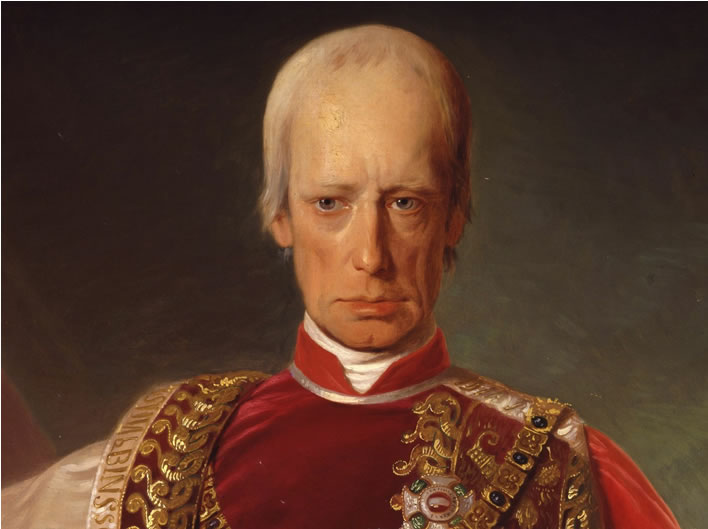
Friedrich von Amerling: Franz II/I in the robes of the Order of the Golden Fleece, 1832. ©Schloß Schönbrunn Kultur- und Betriebsges.m.b.H.
'Go on, I dare you. Ask him for a constitution.'
The Enlightenment: gone almost without trace
Now, with the full benefit of more than two centuries of hindsight, let us turn our enlightened, gimlet eye on the Enlightenment itself, as the enlightened ones such as Montesquieu would themselves had done had they been here today. What's left of it?
Next to nothing.
There are billions of pious Catholics in the world who still believe as articles of faith much of the superstitious nonsense that the sages of the 18th century mocked: the saints, the miracles, the idolatry. I am not singling out Catholics here, there are plenty of other superstitious faiths in the world, but the state of Catholicism now and its state then allow some direct comparisons. As nests of superstition the Protestant faiths are not much better than Catholicism. Christianity has certainly become less officially violent, but apart from that, nothing has changed.
Mohammedanism, as Voltaire would have called it – and as we called it in my school – has spread, propagating its own brand of superstitious nonsense. Its level of institutional violence is probably about the same now as it was then, perhaps even greater, now that the Musselman is firmly within the gates of Vienna and probably never more to be extracted.
We have horoscopes that are written by charlatans and lunatics and nevertheless read avidly by millions; there are millions who believe their dear old Nan is accompanying them through their lives from the beyond, forced to remain 85 years old for the rest of eternity; millions who talk of being saved by their guardian angels when others died (presumably on their own guardian angels' day off); millions wearing charms of all kinds; hard-faced sports stars who carry charms, perform superstitious rituals before competitions or look skywards and cross themselves at appropriate moments.
Voltaire, Holbach et al. explored some of these aberrations, particularly in connection with the terrible Lisbon earthquake of 1755, which chose All Saints' Day to kill around 50,000 people. Nothing has changed.
From our own Solons and Nestors every day we read and hear… well, let us let Voltaire as quoted above speak for us: 'things that are incomprehensible, contradictory and impossibilities'. Nothing has changed.
We have the United States and its now battered constitution, which seem to have justified completely Jefferson's fear of the corrupting power of organizational groupthink – 'the esprit du corps so apt to prevail in permanent bodies', as he put it[10]– the organs of legislature, judiciary and executive utterly diminished in every respect. As we have already noted, the Constitution of the United States was a product of a special, creative aspect of the Enlightenment, so only half a cheer for that. Apart from which there is only decline to be observed.
The Enlightenment was bound to fail, not only because it was destructive in character, but also because it was elitist – that term is used here quite neutrally and without affect. Voltaire and Kant among others point out how taxing enlightenment could be – all this tiresome questioning and examination. Few of us have the energy and single-mindedness of someone like Benjamin Franklin to subject ourselves, our own behaviour and everything else we come across in our daily lives to unremitting scrutiny. This enlightenment process is hard, uncomfortable work that few will do. In a modern business an enlightened employee would probably last less than a week.
Our Enlightenment torch has to be permanently switched on and we must not shrink from shining it into dark places. Who can live like that? As we have seen, Kant noted how comforting the state of being told what to think by someone else was. There were really only a few people then who were prepared to make that sacrifice. Now, in the era of the weapons of mass distraction – television, radio, social media, mobile phones – what chance is there that we can pick up where the Enlightenment left off, on the day the music died in 1789? Nothing has changed.
Uniting under the banner
We cannot therefore talk of the lambent beauty of the Enlightenment without acknowledging the seed of doom that it carried within it. Enlightenment thought is centrifugal, it never unites, it divides. It is critical. It is mocking. It is destructive. It is iconoclastic. And wherever it follows Rousseau's attempt to unite society it leads to disaster.
In order to combat bigotry and superstition we don't need more questioning, we need more conviction. No society ever survived by questioning itself. We need more conviction of the muscular, self-preservation kind if the western civilisations are to survive the onslaught from the east.
When W.B. Yeats writes that
The best lack all conviction, while the worst
Are full of passionate intensity.[9]
he is not praising but criticising the lack of conviction of the best, who spend their time in enlightened questioning of the basis of everything. Even I, an atheist, would stand behind a muscular but non-violent Christian campaign to convert the infidel. Will the Salvation Army bands play in those British no-go areas this Christmas? Will the vicars in these places tour their parishes? Or have they already 'gone native' as previous missionaries to convert the infidel often did?
I would be prepared to suspend my religious disbelief arising from 'the intellect in the mind' as Voltaire put it, for the sake of the 'justice of my heart'.
But even Christians, who really should be the ones doing the heavy lifting in this matter, are now racked with self-doubt, are soggy with soul-sapping relativism and softy 'all-you-need-is-love' thinking, so that this crusade will never happen. After the vigour of the Oxford Movement and the uplifting confidence of the 19th century hymnal the Anglicans have become mere ciphers, pedlars of 'ignorant goodwill', to borrow Yeats' perfect phrase. Corrupted by the mental rot of sixties' ecumenicalism they now believe that all religions have the same value. They may try to evangelize the faithless, the lonely, the desperate and the lost but they will not encroach on the territory of other religions. Let us not forget that 'Islam' means 'submission'. The Christian churches have submitted, though they may not realise it yet. They will go under like the rest of us.
When the current leader of the Labour Party, Jeremy Corbyn, wonders aloud about the legality and rights of bombing our putative opponents and shooting them dead without due process he is thinking as an Enlightenment thinker would. They are as dead as dodos, just as he will be soon.
Update 10.02.2016
I am an Anglican churchgoer. Does the EU, which is in some ways a continuation of the Holy Roman Empire, buttress Western Christianity against militant Islam? Or do its secularist, egalitarian creeds weaken our religious heritage and make us easy meat for militant Islamists?
Quentin Letts, 30 January 2016, Such a sickening betrayal of Britain
References
- ^ We paint with a broad brush on this blog. All dates of historical periods are near enough for our purposes.
- ^ Rudyard Kipling, 'In the Neolithic Age' in The Seven Seas, Methuen, London, 1926, p. 124-127.
-
^
Max Weber, 'Die protestantische Ethik und der Geist des Kapitalismus. I.' in Gesammelte Aufsätze Zur Religionssoziologie, Bd. 1, p. 20.
Die Herrschaft des Calvinismus, so wie sie im 16. Jahrhundert in Genf und Schottland, um die Wende des 16. und 17. in großen Teilen der Niederlande, im 17. im Neuengland und zeitweise in England selbst in Kraft stand, wäre für uns die schlechthin unerträglichste Form der kirchlichen Kontrolle des einzelnen, die es geben konnte. Ganz ebenso wurde sie auch von breiten Schichten des alten Patriziats der damaligen Zeit, in Genf sowohl wie in Holland und England, empfunden. - ^ Alexander Pope, An Essay on Man: Epistle II, 1734, ll. 1-2
-
^
Immanuel Kant, 'Beantwortung der Frage: Was ist Aufklärung?' (1783), in Schriften zur Anthropologie Geschichtsphilosophie Politik und Pädagogik, Darmstadt, 1966, p. 53
Aufklärung ist der Ausgang des Menschen aus seiner selbst verschuldeten Unmündigkeit. Unmündigkeit ist das Unvermögen, sich seines Verstandes ohne Leitung eines anderen zu bedienen. Selbstverschuldet ist diese Unmündigkeit, wenn die Ursache derselben nicht am Mangel des Verstandes, sondern der Entschließung und des Mutes liegt, sich seiner ohne Leitung eines andern zu bedienen. Sapere aude! Habe Mut, dich deines eigenen Verstandes zu bedienen! ist also der Wahlspruch der Aufklärung. -
^
Christian Friedrich Daniel Schubart, Schubarts gesammelte Schriften, Bd. I, Stuttgart, 1839, p 267-8.
Eine schreckliche Begebenheit, die nur im finstersten Winkel des katholischen Schwaben geschehen könnte! -
^
Voltaire, Collection des lettres sur les miracles, Neufchatel, 1767, p 150f. Online text.
Il y a eu des gens qui ont dit autrefois: Vous croyez des choses incompréhensibles, contradictoires, impossibles, parce que nous vous l’avons ordonné; faites donc des choses injustes parce que nous vous l’ordonnons. Ces gens-là raisonnaient à merveille. Certainement qui est en droit de vous rendre absurde est en droit de vous rendre injuste. Si vous n’opposez point aux ordres de croire l’impossible l’intelligence que Dieu a mise dans votre esprit, vous ne devez point opposer aux ordres de malfaire la justice que Dieu a mise dans votre coeur. Une faculté de votre âme étant une fois tyrannisée, toutes les autres facultés doivent l’être également. Et c’est là ce qui a produit tous les crimes religieux dont la terre a été inondée. -
^
William Wordsworth, 'French Revolution' (1805), later (1850) in Book 11 (eleven) of The Prelude.
Despite the public revulsion in the first quarter of the 19th century at the events of the French Revolution, Wordsworth let his original words stand unaltered, as the authentic expression of the feeling of the times. - ^ 'The Second Coming', Michael Robartes and the Dancer in Collected Poems, Macmillan, London, 1965, p. 210f.
-
^
The Writings of Thomas Jefferson, ed. H.A. Washington, New York, H.W. Derby, 1861. 'President Thomas Jefferson to Secretary of Treasury Albert Gallatin. Washington, December 13, 1803.'
[The principle of rotation] breaks in upon the esprit du corps so apt to prevail in permanent bodies ; it gives a chance for the public eye penetrating into the sanctuary of those proceedings and practices, which the avarice of the directors may introduce for their personal emolument, and which the resentments of excluded directors, or the honesty of those duly admitted, might betray to the public;
0 Comments UTC Loaded:
Input rules for comments: No HTML, no images. Comments can be nested to a depth of eight. Surround a long quotation with curly braces: {blockquote}. Well-formed URLs will be rendered as links automatically. Do not click on links unless you are confident that they are safe. You have been warned!